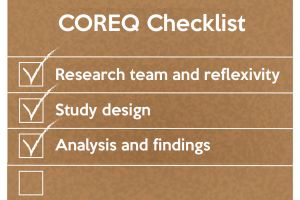
The accessibility of the internet is changing the way people learn about their illness, with “Dr Google” (as some health professionals may derogatorily call it) only a few search terms away. The online health information people find could potentially influence the decisions they make about how they manage their health and the kinds of treatment they want to receive. The authors suggest this may particularly be the case for people with stigmatised conditions.
There is a growing body of research into the experience of specific interventions delivered over the internet, such as computerised therapy, but this study wanted to explore how people with psychosis use the internet to learn about their condition and the implications of this.

This qualitative study looked at how people with psychosis use the internet to learn about their condition.
Methods
- The study aimed to qualitatively explore the experience and perceptions of people with psychosis using semi-structured interviews
- Participants were recruited through an Early Intervention Service for psychosis, an NHS residential Crisis House and an Acute Day Unit
- 22 people were interviewed for the study. The authors report that one interview was cut short due to the patient experiencing symptoms, but it’s not clear whether this interview was excluded from the analysis (the authors mention that the interview ended before the participant could “discuss the more complex questions”).
Results
- Use of the internet was common, which contrasted to the view that people with psychosis aren’t as digitally active as the general population.
- Few of the participants were aware of specific NHS or mental health charity resources, and none of those with smartphones had used specific mental health apps. Wikipedia and Google were most frequently used.
- Information about medication and medication side-effects was the most common reason for searching online.
- Beyond seeking specific information about diagnoses and treatments, participants also discussed specifically searching for first-hand personal accounts of illness experience. These helped reassure them about their own experience or suggested ways of coping with the condition.
- It appears that those who don’t search online are those who trust the information provided by health professionals. This issue of trust also fed into how people used that information. The authors differentiated “collaborators”, who discussed the information they found with their clinicians, from “parallel universes” who kept these two areas separate and in some cases trusted the online information more than NHS professionals.
- Collaborators felt empowered to discuss the information with their team, whereas those in the “parallel universe” felt that clinicians would disprove of them seeking out information in case it contradicted their expert position.

Are you a “collaborator” or a “parallel universe”?
Conclusions
The authors say:
The results of this study suggest that while some participants find online information helpful and reassuring, for others who do not use this information collaboratively with their mental health team, it can lead to concern and affect health related decisions…
Participants reported that they did not volunteer information about their Internet use for fear of undermining their clinician’s authority…This has repercussions for shared decision-making beyond digital technology and may reflect perceived inequalities of power in the therapeutic relationship.
A partnership approach to online health information-seeking is needed with mental health clinicians encouraging patients, particularly those with a longer psychiatric history and from an older age group, to discuss information they have found online as part of a shared decision-making process.
The study demonstrates the importance of sampling from different groups. In this study, younger people from the Early Intervention Service could be compared to older people from acute care settings and this revealed the “collaborator”/”parallel universe” distinction.
Despite some limitations (listed below), I think the study does a good job of capturing the ambivalent nature of using the net for health information (in contrast to hailing the internet as either the saviour of health literacy or the destroyer of the patient-clinician relationship). Using the net for health information can have both positive and negative effects, for some patients more than others, and this demonstrates why increasingly clinicians need to consider how this digital health seeking may impact their patients and find ways to support them to discuss their concerns.
As part of the NIHR New Media competition, the authors have produced a snazzy YouTube video that summarises the paper:
Limitations
- Interviews were only conducted by one person, described as an academic clinical fellow in psychiatry. It can be helpful to have at least two different people interviewing, so they can compare how the interviews go and check that they pick up similar issues.
- I’m a bit of a fake-it-till-you-make-it qualitative researcher (all my training was quantitative, but the bulk of my work now is qualitative) and have myself fallen foul of reviewers saying that the analysis is more a descriptive narrative report (“One participant said this, Four participants said that”) than an in-depth qualitative analysis. I think this study is perhaps victim to that problem as well. The analysis at times reads like a list of disparate comments about interview contents. The most thematic part is the “collaborator”/“parallel universe” concept but it’s not well articulated how these issues were identified and why those terms were chosen.
- In general there’s not a huge amount of detail about how the analysis was conducted, beyond it being thematic. For example, they could have talked about how the thematic framework was developed, whether they particularly looked out for different views and so on. Or, alternatively, these steps weren’t undertaken, and this may account for the lack of depth in the themes reported.
- It’s still an issue of contention as to whether qualitative research can or should adhere to quality reporting frameworks such as COREQ, but in papers which perhaps lack some methodological detail, such as this one, I think it could have been helpful.

The COREQ checklist was developed to promote explicit and comprehensive reporting of qualitative studies (interviews and focus groups).
Links
Primary paper
Aref-Adib G, O’Hanlon P, Fullarton K, Morant N, Sommerlad A, Johnson S, Osborn D. (2016) A qualitative study of online mental health information seeking behaviour by those with psychosis. BMC Psychiatry 2016 16:232 DOI: 10.1186/s12888-016-0952-0

How do people with psychosis use online health information, and do they tell their clinicians? https://t.co/w7JoZg5iLJ
People with psychosis are googling their symptoms but few are using NHS/mental health charity resources https://t.co/7XZVgxiUKv
Morning! @docgolnar @PuffinOH @katecharlie4 @atsommerlad @soniajohnson @osborn_ucl Pls read our blog today https://t.co/22QOOTI6lH
@Mental_Elf @PuffinOH @katecharlie4 @atsommerlad @soniajohnson @osborn_ucl Thank you for bringing this to people’s attention! Great blog.
Today @dr_know on qualitative study of online mental health information seeking behaviour by those with psychosis https://t.co/22QOOTI6lH
@Mental_Elf @dr_know though the most likely reason patients don’t talk with the dr would be characteristics of the dr- not studied here
@validconsent @Mental_Elf absolutely agree! but I try to avoid claiming as a limitation something the study wasn’t setting out to do
@dr_know @Mental_Elf how patient behaviour is interpreted in the study seems to reveal a particular set of assumptions by the researcher.
@validconsent @Mental_Elf what kind of assumptions?
@dr_know @Mental_Elf I’ve had some wine now :)
@dr_know @Mental_Elf maybe that patients should share that they have looked things up on the internet- we all need privacy and time to think
@dr_know @Mental_Elf that if they don’t share its a characteristic of them not their clinician
@validconsent @Mental_Elf I do think it’s an area they could have explored more though and one of the things lost by lack of analysis maybe
Great blog on our research! https://t.co/ORoPMzQLcl Thanks @Mental_Elf @PuffinOH @soniajohnson @osborn_ucl #bmcpsychiatry
@Mental_Elf blog on our study of online mental health information seeking by people with #psychosis – https://t.co/MbukpFezJK
How do people with psychosis use online health information, and do they tell their clinicians?… https://t.co/mBc19tcsdt
@dr_know & @Mental_Elf ‘How do people with #psychosis use online health information, and do they tell clinicians’ https://t.co/k1B4W39TAm
#FF
Thanks for the top blogs this week!
@jonesir https://t.co/OvGxS3dHS7
@dr_know https://t.co/22QOOTquX7… https://t.co/ha21UhnUhm
Most popular blog this week?
It’s @dr_know How do people with psychosis use online health information?… https://t.co/s5qCeIw75Q
what methods are used to define it ?
O.O
https://t.co/dBbUoMrp7k
@Mental_Elf @dr_know @djrobotham @docgolnar @soniajohnson @UCLPsychiatry
How do people with Psychosis use online #Health #Information? https://t.co/4UXhLtjYnt via @Mental_Elf #MentalHealth
https://t.co/onSK6kcbKF. #psychiatric patients and use of online health information. #mentalillness #amhp
How do people with psychosis use online health information, and do they tell their clinicians? https://t.co/ZMPaioNEp0 via @Mental_Elf
not many people are aware of NHS or mental health charity resources. Wikipedia and Google were most frequently used.
[…] including whether the authors think services need to do more to engage with such people. We’ve blogged previously on a study which considered how people who are active online can be both “collaborators” with […]